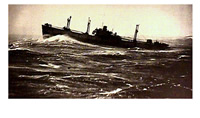Voyage Two
SS Edwin W. Moore - Page 8
The SS Edwin W. Moore sailed in a group of ships from Sicily for Malta, December 21, 1943. It was to join another group of ships that evening off Malta that had sailed from Alexandria, Egypt on December 17th in Convoy GUS - 25. Late that afternoon the Dutch transport Alpherat was sunk when German aircraft attacked the convoy at 1648 and 1707 about 12 miles Southeast of Malta. The British Admiralty list of ships in convoy GUS - 25 , includes the Edwin W. Moore, that gives ports of departure and destinations, notes: "ALPHERAT sailed Port Said 16 Dec. for U.K. but was sunk by aircraft 21 Dec." and that two covering British Mosquito aircraft claimed to have damaged two JU 88 bombers during the attack." The planes seen by the crew and guards of the Moore that over flew them were some of the planes that attacked and sank the Alpherat.
When the two groups joined at Malta, GUS-25 was a 47 ship convoy with an escort of one British destroyer, three corvettes and an armed whaler. Ships detached or joined as the convoy proceeded to Gibraltar. The ocean section of GUS-25 was under the direction of the U.S. Navy and included 56 merchant ships and 13 escort vessels of different classes: including four destroyers, six brand new destroyer escorts, a Navy fleet oil tanker and an ocean going tug.
Christmas Eve 1943 we were
sailing west in the Mediterranean.
( Speed of the convoy in the Mediterranean varied from 4 to 9 knots - Armed Guard report. ) The radio officer gave everybody a mimeographed copy of a Christmas message from President Roosevelt to all us at sea thanking us for the job we were doing. That evening Captain Quinn came down to the galley
with some bottles of whiskey. He wished us all a Merry Christmas and said that
he didn't care how much we drank but he didn't want any fighting. He said to
enjoy ourselves but if anybody got to fighting there would be hell to pay; and
he expected everybody to be able to stand their morning watches. Quinn was a
good old man - most captains wouldn't have done that.
( Ensign Karnemont in his
report at the voyage's completion wrote, ". . .there was considerable drinking
on the part of the Merchant crew on the night of December 24, 1943, which I
think should have been prevented. " ). ( Ensign Karnemont reported "warnings
of enemy contact from time to time. . . . .second day out of Gibraltar when the
destroyer off our starboard bow dropped depth charges, and on January 13, 1944,
when we were notified that a submarine had been sighted one hundred miles dead
ahead. . . . . We altered our course shortly thereafter." )
When we got out into the Atlantic we hit some rough weather. It was a real storm
and went on for days. Scuttlebutt was that we had been notified of the storm
and could have gone around it but the Convoy Commodore decided to go straight
through it. When you see waves going over the smoke stack, it's rough. You can't
stand up or move around without holding on to something. Ships can't hold their
convoy positions in weather like that and end up all over the place. It is dangerous
because ships can collide. There is a positive side though; when it is really
rough submarines can't operate very effectively to launch torpedo attacks.
We had to eat sandwiches. You can't cook any hot meals because you can't keep pots and pans on the stove or dishes from sliding around and overturning. Not that we had much to cook with. We had been gone for more than five months and we were running out of food. The last days out all we had was barley soup and the barley was full of little black bugs - weevils. Finally we even ran out of that. The Captain had Walker cook him the last chicken we had - he baked it. A couple of us who worked the galley and mess snuck in and ate his chicken. Jesus, the old man hit the ceiling. Quinn was beside himself to find out who ate his chicken but he never did.
( The Convoy Commodore,
Captain S. F. Cummings, USNR reported "CONTINUOUS ROUGH WEATHER WEST OF
THE AZORES. ANNEX "B" GUS-25: 1. On 3 January SS Robt. G. Ingersol
reported that they had four days supply of food left.
2. Numerous liberty ships
having to repair steering gear. . . . .heavy vibration on propeller came out of
water in heavy weather. . . 3. All liberty ships in ballast had difficulty in
maintaining course during winds of thirty-five miles force. All making about
full speed and not answering hard over rudder. Ballast insufficient and poorly
placed. 4. Liberty ships in ballast rolling 35 to 40 degrees in four and a half
seconds." )
Former Armed Guardsman Harold Light writes in a letter of 1/30/2000: "Ship ran out of food except soup and coffee 6 days out of port. Last day - nothing. "Former Armed Guardsman William Joyce in a 12/25/1999 phone conversation remembered running out of food and "only having crackers to eat."
The Commodore reported detaching ships running out of fuel and sending them into the Bahamas. The SS Edwin W. Moore detached in company of 36 merchant ships bound for New York on 14 Jan. 1944. Eighteen ships including the Commodore's proceeded to Chesapeake Bay. Speed of Convoy GUS-25 had varied between 6 and 9 knots in the Atlantic.


